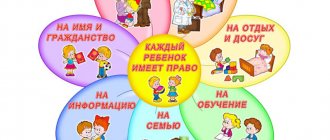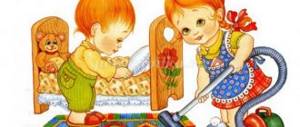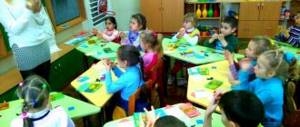Consultation for parents “The role of the family in raising a child” consultation on the topic
MDOU kindergarten No. 28 “Tuyana” 1st junior group “Bees”
Consultation “The role of the family in raising a child”
The role of parents in raising children is very important - the development of the life scenario of a growing child depends on them.
The family is traditionally the main educational institution. What a child acquires from the family during childhood, he retains throughout his entire subsequent life. The importance of the family as an educational institution is due to the fact that the child stays in it for a significant part of his life, and in terms of the duration of its impact on the individual, none of the educational institutions can compare with the family. It lays the foundations of the child’s personality, and by the time he enters school, he is already more than half formed as a person. The family is a powerful factor in the formation of personality, the development of universal and individualized qualities in it, because in the family the child first learns norms of behavior, relationships and feelings towards himself and others.
The family provides initial education, physical, psychological and generally social protection and support for children.
Good parents raise good children. Future parents think that they can become like this by studying specialized literature or mastering special methods of education, but knowledge alone is not enough. Parents constitute the child’s first social environment. The personalities of parents play a vital role in the life of every person. It is no coincidence that we mentally turn to our parents, especially our mother, in difficult moments of life. That is why the first and main task of parents is to create confidence in the child that he is loved and cared for. Never, under any circumstances should a child have doubts about parental love. Deep, constant contact with a child is a universal requirement for upbringing. The basis for maintaining contact is a sincere interest in everything that happens in the child’s life. Contact can never arise by itself; it must be built even with a baby. When we talk about mutual understanding, emotional contact between children and parents, we mean a certain dialogue, interaction between a child and an adult with each other. It is when the child participates in the common life of the family, sharing all its goals and plans, that the usual unanimity of upbringing disappears, giving way to genuine dialogue. The most significant characteristic of dialogic educational communication is to establish equality of positions between the child and the adult. Negative assessments of the child’s personality and inherent character qualities should be categorically abandoned. Monitoring negative parental assessments of a child is also necessary because very often parental condemnation is based on dissatisfaction with one’s own behavior, irritability or fatigue, which arose for completely different reasons. Child's independence. The bond between parent and child is one of the strongest human bonds. If children, growing up, increasingly acquire a desire to distance this connection, parents try to hold on to it as long as possible. The solution to this problem, in other words, providing the child with one or another measure of independence is regulated primarily by the child’s age. At the same time, much depends on the personality of the parents, on the style of their attitude towards the child. It is known that families vary greatly in varying degrees of freedom and independence provided to children.
Mistakes of family education.
For some parents, raising a child is motivated by the so-called achievement motivation. The purpose of education is to achieve what the parents failed due to lack of necessary conditions, or because they themselves were not sufficiently capable and persistent. Such parental behavior, unconsciously for the parents themselves, acquires elements of selfishness: “We want to mold the child in our image, because he is the continuer of our life...” But the child can also rebel against demands that are alien to him, thereby causing disappointment to the parents due to unfulfilled hopes, and As a result, deep conflicts arise in the relationship between the child and parents. There are families where the goals of education seem to move away from the child himself and are directed not so much at him, but at the implementation of the education system recognized by the parents. Some parents follow the ideas of the educational provisions of the Nikitin family, which defend the need for early intellectual training, or the call: “Swim before you walk”; in other families there is an atmosphere of complete forgiveness and permissiveness, which, in the opinion of parents, is carried out by the “Spock” model of education, forgetting that it is not the child for education, but education for the child. Education as the formation of certain qualities. In these cases, the parent structures his upbringing in such a way that the child is necessarily endowed with this “especially valuable” quality. For example, parents are confident that their son or daughter must be kind, erudite and courageous. In cases where the values of parents begin to conflict either with the age-related characteristics of the child’s development, or with his inherent individual characteristics, the problem of independence becomes especially obvious. What is the purpose of education? The purpose of education is to promote the development of a person distinguished by his wisdom, independence, artistic productivity and love. It is necessary to remember that you cannot make a child a human being, but you can only facilitate this and not interfere, so that he develops a human being within himself.
The main principles that must be adhered to when raising a child during his family life: purity, consistency in word and deed when treating the child, absence of arbitrariness in the actions of the teacher or the conditionality of these actions and recognition of the child’s personality, constant treatment of him as a person and full recognition of his right to personal integrity. The whole secret of family education is to give the child the opportunity to develop himself, to do everything himself. Adults should not run around and do nothing for their personal convenience and pleasure, but should always treat the child, from the first day of his birth, as a person, with full recognition of his personality and the inviolability of this personality.
Memo for parents to raise a Human
NEED TO:
-Accept the child as he is, so that under any circumstances he is confident in the unchangeability of your love for him.
-Strive to understand what he thinks about, what he wants, why he behaves this way and not otherwise.
-Inspire the child that he can do anything if he only believes in himself and works.
-Understand that for any misdeeds of a child, you should blame yourself, first of all.
-Do not try to “sculpt” your child, but live a common life with him; see him as a person, and not as an object of education.
-Remember more often what you were like at your child’s age.
-Remember that it is not your words that educate, but your personal example.
IT IS FORBIDDEN:
- Expect your child to be the best and brightest. He is neither better nor worse, he is different, special.
-Treat the child as a savings bank, into which parents profitably invest their love and care, and then receive it back with interest.
-Expect gratitude from the child for the fact that you gave birth to him and fed him, he did not ask you for this.
-Use the child as a means to achieve even the most noble (but your own) goals.
-Expect that your child will inherit your interests and views on life (alas, they are not genetically determined).
-Treat the child as an inferior person whom parents can mold at their discretion.
-Shift responsibility for upbringing to teachers and grandparents!
Consultation “Family education”
Methods of family education bear a vivid imprint of the personality of the parents and are inseparable from them. How many parents - so many varieties of methods
.
Basic methods of family education:
persuasion (explanation, suggestion, advice);
personal example;
encouragement (praise, gifts, interesting prospects for children);
punishment (deprivation of pleasures, refusal of friendship, corporal punishment).
There are 4 parenting styles: democratic, authoritarian, liberal, indifferent.
Authoritarian parenting style
As it is easy to assume from the first name, the attitude of an adult towards a child is based on the opinion that the child is not independent, inactive, that various manipulations can be performed with him that will effectively influence the child’s development and lead to the desired result. The result, it is important to note, is known to adults: “an obedient, efficient, comfortable child.” The child is perceived as an object of influence, whose interests and opinions are not of decisive importance. The authoritarian style is a pedagogy of suppression, violence and coercion.
Coercion and suppression will breed deceit, bitterness and self-rejection.
Democratic parenting style
Unlike the previous style of education, this position is based on the recognition of the child’s rights to independence, activity, creativity, opinions, and mistakes. The child is a full participant in the dialogue; he is listened to and heard. The child’s happiness, both momentary (here and now) and in the future, becomes an undeniable priority of upbringing. This style of interaction does not deny the authority of an adult, but it makes a number of demands on the personality of the parent and teacher. First of all, this is a rejection of the comfortable “on top” position in favor of the “next to, together” position. The main thing in this style of education is mutual trust.
Liberal parenting style
As the name implies, this style of parenting is based on providing the child with freedom, often unlimited. A child in a liberal family is pampered in every possible way and is not denied anything. Can a child exist without restrictions and prohibitions? As a rule, a child whose behavior is always accepted by parents, whose misdeeds they turn a blind eye to, experiences significant difficulties when entering kindergarten or school. After all, such a child did not have the opportunity to get used to the fact that there may be restrictions and rules in life. When faced with unpleasant prohibitions, the child will respond with disobedience.
Indifferent parenting style
Parents who are busy, tired, and exhausted at work sometimes have “no time for the child.” Everyone in the family is on their own, everyone has their own problems, everyone has their own world. Adults “don’t care” how the child will grow up, what worries him now. As a rule, children feel very strongly that they are useless and unimportant. The indifference of the closest people becomes the basis for the development of a child’s negative self-esteem.1
consultation for parents “Family education” consultation on the topic
Consultation for parents Family education.
A family is an initial organization of members of society that arises on the basis of a marriage, connected by kinship and economic relations, living together and bearing moral responsibility for each other. Throughout human history, the family has been the economic unit of society and has served the purpose of preparing children for certain roles in society.
The following characteristic features of the family have a direct influence on the process of raising children: structure, living conditions and environment, cultural potential, sphere of activity, intrafamily relations, civic position. The level of pedagogical culture of parents is also of great importance.
The shortcomings of family education are the result of incorrect relationships between parents and children: excessive severity or excessive love for the child, lack or insufficient supervision over him, low general culture of parents, bad example on their part in everyday life, etc.
The authority and personal example of parents.
Authority should be understood as children’s deep respect for their parents, voluntary and conscious fulfillment of their demands, the desire to imitate them in everything and listen to their advice. The entire power of parental pedagogical influence on children is based on authority. But it is not given by nature, is not created artificially, is not won by fear or threats, but grows out of love and affection for parents. With the development of consciousness, authority is consolidated and gradually decreases and is reflected in the behavior of children. The educational power of parents' personal example is determined by the psychological characteristics of preschool children: imitation and concrete thinking. Children unconsciously tend to imitate both good and bad, to follow examples rather than moral teachings. That is why parents’ demanding control over their behavior is so important, which should serve as a role model for children.
The positive influence of the example and authority of parents is enhanced if there are no discrepancies in the words and actions of parents, if the requirements presented to children are uniform, constant and consistent. Only friendly and coordinated actions provide the necessary pedagogical effect. Important in creating authority is also the respectful attitude of parents towards the people around them, showing attention to them, and the need to provide help.
The authority of parents largely depends on their attitude towards their children, on their interest in their lives, in their little affairs, joys and sorrows. Children respect those parents who are always ready to listen and understand, to come to the rescue, who are always ready to help, who intelligently combine demandingness and encouragement, fairly evaluate their actions, are able to take into account desires and interests in a timely manner, establish communication, and contribute to the strengthening of friendly relations. Children need intelligent and demanding parental love.
Pedagogical tact is a well-developed sense of proportion in dealing with children. It is expressed in the ability to find the closest path to the feelings and consciousness of children. Choose effective educational measures to influence their personality, taking into account age and individual characteristics, specific conditions and circumstances. It presupposes maintaining a balance in love and severity, knowing the real motives of children’s actions. The correct balance between exactingness and respect for the dignity of the child’s personality.
The tact of parents is closely related to the tact of children - with a responsible sense of proportion in behavior based on a sensitive and attentive attitude towards people. At first it manifests itself as imitation caused by the example of elders, and later it becomes a habit of behaving tactfully.
Family culture.
The concept of cultural life includes correct relationships between family members, respect for each other, as well as reasonable organization of the entire life of the family. At the same time, children learn to independently reason and evaluate facts and phenomena, and parents pass on life experience to them, help them establish correct judgment and unobtrusively guide their thoughts. Conversations with a child in a free and cordial atmosphere create closeness between parents and children and become one of the means of parental influence.
Problems in upbringing often arise where the general life of the family is not sufficiently organized. The remnants of the old way of life, preserved in some families, also have a negative impact on the character and moral qualities of children; wrong attitude towards women, alcoholism, prejudices and superstitions.
Raising children in a family is also influenced by external conditions: the culture of the home environment, compliance with hygienic, general cultural and aesthetic requirements.
Knowledge of the age and individual characteristics of children.
Knowing the characteristics of children allows parents to learn how to properly treat them. Increases responsibility for their upbringing and ensures unity and consistency in the requirements for children from all family members.
Special pedagogical knowledge helps develop children's inquisitiveness, observation, the simplest forms of logical thinking, guide play and work, and understand the reasons for children's actions.
Parents' awareness of the physiological and psychological characteristics of young children helps them not only take care of the child's health, but also purposefully develop movements, cultural and hygienic skills, speech, and communication activities.
Types of families.
Several types of families can be distinguished.
1 type Prosperous families. This type of family is characterized by ideological conviction, high spiritual values and needs, and citizenship. Relationships between parents in these families are built on love and respect for each other, and a creative approach to family education is noticeable.
Type 2 Formally prosperous families. And they are characterized by ideological conviction, a responsible attitude to production duties, but there is no respect between family members and spiritual closeness.
Type 3 Dysfunctional families. There are no spiritual interests, an indifferent attitude towards work and family responsibilities, a lack of labor traditions in the family, and disorder in housekeeping.
Type 4 Single-parent family. These are families in which one of the parents is missing. Such a family can be prosperous if it is characterized by an ideological orientation, knowledge of the goals and objectives of education, and not prosperous if these conditions are violated.
Raising a girl in a family. Consultation for parents
Consultation for parents of preschool educational institutions. Raising a girl in a family
For many centuries, raising children has been carried out both in the family and in public institutions.
Along with the development of public education, family education also retained its importance. There is not a single pedagogical system that does not address issues of family education. We can talk about three main directions in this issue : first, recognition of the leading role of family education; second, underestimation of the role of the family in education; third, public and family education fulfill their purpose only in unity. I, following Johann Heinrich Pestalozzi, am a supporter of the first direction. The great teacher considered the family, the father’s home, to be the basis of a person’s natural upbringing. “The family relations of men are the first and most natural relations.” [1] The strength of family education, Pestalozzi noted, is that it occurs in the process of life, in relationships of intimacy, in the deeds and actions that the child performs. In his relationships with his mother and father, he learns his first responsibilities to society. In a family, a child is accustomed to work early. Vigor, contentment and moderation in passions develop in a person from an early age through the joys of home and the performance of household duties. Under the influence of family principles and the entire family structure, strength of character, humanism, and a focused mind are cultivated. It is in the family that the child experiences a feeling of love for his parents and receives love and affection from them. The family takes an individual approach. Emphasizing the educational importance of the family, Pestalozzi does not oppose public education, but he believes that the school should build its education on the principle of family relationships. This point of view of the great scientist really appeals to me. So, family education . Who is preferable to raise in a family – a boy or a girl? Many parents are relieved when a girl is born into the family. For some reason, it is common to think that a girl is necessarily meek, submissive and obedient. It is believed that there are no problems with girls. Today we will talk about raising a girl, probably because I myself am a girl. If a young mother and father do not think about who they want to raise and educate, then their child will grow up on his own, without Mom and Dad in the role of Educator, Teacher, Mentor, Friend, who is always nearby and a little ahead. And yet, many parents do not think about the fact that raising a child is a very labor-intensive, complex, lengthy, but creative task, which is sometimes painful, but always a family, family relationships in motion, in development; stagnation can sometimes lead to the collapse of a family. So, we are waiting for a girl. I think it’s unnecessary to say that both mom and dad need to thoroughly prepare before the birth of a child. And not only financially, but also morally. First of all, it is necessary to read a lot about raising girls and boys, and, most importantly, future parents must know exactly who they want to raise: children with whom they will be considered in the future, communicate, consult and be proud of them, either obedient, unquestioning amoebas who will be dependent on their parents all their lives: on their money, opinions, decisions... If you want your child to be an individual, then start raising him from the first days of birth of your long-awaited Miracle, your Girl or Boy... At the present stage They say and write a lot about what a pregnant woman needs not only to eat and drink, but what books to read, what films to watch, what music is preferable to listen to. Well, we will talk about what happens after your baby is brought home from the maternity hospital. Of course, you want your baby to grow into an independent person with self-esteem and her own point of view. Then you, dear mom and dad, need to treat your little daughter not just with love, but with respect. Therefore, start with yourself. After all, your little princess will follow your example. It is your behavior that will be the guideline for your daughter for many years. Undoubtedly, you want your girl to grow up to be a real LADY. That is why, before you start raising your daughter, start with yourself even before the birth of the child. Remember, only your careful and respectful attitude towards the girl, without shouting, without tugging at the child, no matter how old she is - two or seventeen, will give her the opportunity to grow into an integral, independent person. Never yell at your child, your little one! Shouting will not develop any character traits; on the contrary, it will develop in a girl insecurity, a feeling of inferiority, and a fear of taking independent steps and making decisions on her own. Screaming leads to the fact that children, both boys and girls, are afraid of everything, often become meek executors of someone else’s will, end up in bad campaigns, and cannot independently solve their problems, even the simplest ones. And already in adolescence, they are also afraid to turn to their parents for advice. Call your baby by name only. By this you emphasize both your love for her and respect. A dismissive attitude is often expressed by calling the child by a half name: Masha, Tanka, etc. Stop, don't do this! If the girl is at a very young age, you can call her by a diminutive name, but you will not always call her Mashenka. Later, as she grows up, she will become both Masha and Maria. Even if she has a pet nickname, let it be affectionate and in no way offensive. In our emancipated age, when girls are even accepted into military schools, it is difficult to raise a girl: a gentle, sensual, lovely young lady, but we will take the risk?! After all, a modern girl needs to not only be courageous, but also know the “measure” of this masculinity. There is nothing worse when a tender, feminine, vulnerable girl shows her femininity only in whimpering and discontent. This is already a whim, spoiling, which we would really like to avoid. There is, of course, a line between femininity and masculinity, but there is no need to exaggerate it. Modern girls should be able to courageously accept all the blows of fate, not whine and whine without reason. In general, a child, both a boy and a girl, should be raised in such a way that they do not expect that “manna from heaven” will begin to fall from heaven for them. The child must understand that her success will depend only on the efforts of the girl herself. And mom and dad will support her, help as needed, but not do it for her. I believe that from a very early age, dad and mom should instill femininity in a girl. How can you cultivate femininity? I think a girl should have a choice from an early age: to wear her hair long or short. It is impossible to forcibly cut a girl's hair or forcibly grow her hair long - this is violence against the individual. A girl must have beautiful bows, hairpins, and elastic bands. It's not even a question of price. It’s just that a mother should be interested in the fact that her girl will always be well-groomed and clean from a young age. It will smell fresh on your hair, skin, body and clothes. Here lies the commandment of our great-grandmothers: let the outfits be inexpensive, but clean, ironed, smelling fresh, selected according to her figure and age, suitable specifically for your daughter: her style, character, behavior, manners. And, believe me, dear mothers, your daughters will thank you more than once for this “secret” of upbringing, because it is this that will allow your beloved daughter to always be “on top” - to look great at any age and at any time. Femininity is manifested not only in beautiful and well-groomed hair. The most important thing in the matter of femininity is the manner of communication and adherence to etiquette. The girl must be taught the rules of behavior in society, among her peers, among adults, etc. You, of course, agree that femininity is also manifested in a calm manner of conversation, the desire to make this world a better, cleaner and more joyful place. The obligatory traits of femininity include kindness, honesty and decency, and above all, how a girl will relate to the people around her. Will she show attention, mercy, care, sensitivity, compassion towards them: will she be able to help the old lady cross the street or will she brush her off like an annoying fly? Of course, you need to take care not only of your hair, but also of your clothes and shoes. And a mother must teach her daughter all this. It is better to teach your child this from a very early age. At first, you yourself will take care of the girl’s clothes, then you need to gradually, as she grows up, teach her to clean her shoes, toiletries, and keep her clothes clean. In this way, you teach your child to be independent and at the same time cultivate cleanliness in her. In my opinion, the factor of choice is very important for a child. Teach your girl to this from early childhood. Let the little girl choose an outfit for going to kindergarten tomorrow, choose socks for her dress, a scarf, a skirt, etc. This develops in the girl not only the ability to make decisions on her own - “selfhood,” but also taste. Undoubtedly, your relationship with your husband, your daughter’s father, will play a huge role in the development of your child’s personality. Looking at your relationship, the girl will continue to build her relationships with the opposite sex in the same way, copying the relationships of her parents. It’s good when dad can admire a girl, tell her how beautiful, smart, kind, caring she is, etc. This, in turn, allows her to develop the qualities that her father encourages. Already at an early preschool age, a girl should understand the words “possible” and “impossible.” If you forbid her something, it means that dad and grandparents should have the same requirements. Moreover, it is better if you explain this or that prohibition. This act will show both trust and respect towards your daughter. It is very good if your daughter has some kind of responsibilities around the house from an early age. This should not be a very difficult task, within the capabilities of your girl, but at the same time, very important for the family. Let your daughter buy bread every day or pick up the mail or take out plastic bottles in a container, the main thing is that she does this every day or once a week, without prior reminder, of her own free will and conviction. Maybe she will wipe her own shoes, and eventually her younger child’s. The main thing is that the girl has responsibility for the assigned task, so that the girl performs it with full dedication, with awareness of what is happening: “If not me, then who?” And it is also very important that the baby can do the task. It should not be associated with great responsibility, correspond to age, physical strength, i.e. You cannot give a child an assignment that is beyond his abilities. Remember that your daughter can have secrets from you, and at any age: let it be a hidden bug in a box or a new blouse from a friend that she gave for the evening. Treat this with understanding and respect. Just try really hard to find a “common language” with your daughter. It depends only on you whether you and your daughter will have a trusting relationship. But, if you promised your daughter something (at any age), be sure to fulfill your promise, no matter what the cost. Otherwise, the girl will never trust you again.
We recommend watching:
Do children need fairy tales Consultation for kindergarten parents Raising a child in a family How to preserve the mental health of children
Similar articles:
How to deal with the whims of a 2 year old child
Masaru Ibuka technique
Fun games for children and adults
Types of family education and their characteristics
The influence of parents on the formation of a child's personality






